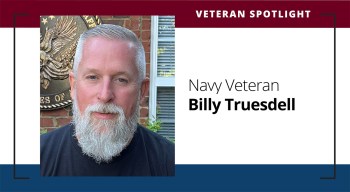Billy Truesdell enlisted in the Navy in 1986 and, for eight years, oversaw hydraulics systems for helicopters and DC-9 aircrafts. He enjoyed the structure and change of scenery the Navy offered, particularly when visiting foreign cities such as London and Sicily.
After getting out of the Navy and experiencing a bout of homelessness, he found the place he belongs most: helping other Veterans. But finding that home wasn’t an easy journey.
All possessions destroyed by fire
In 1990, Truesdell’s apartment and all his possessions were destroyed by a fire. Two days later, he was scheduled to be on a helicopter flight that crashed and killed everyone on board. “On that day, my active drinking took off,” Truesdell recalled. Once he began drinking, it was hard to stop.
As he pursued a civilian career in law enforcement, he discovered heavy drinking was not viewed as a negative behavior. It was part of the culture at the time.
Looking back, he knew that being surrounded by normalized heavy alcohol use was poisonous. “I always knew I was an alcoholic,” he said. “But in 2010, it became obvious.”
“A hell of a ride”
Alcohol seemed to take nearly everything Truesdell had, including his marriage, his license, his job and his ranch. He was even charged with driving under the influence.
As he stood in front of the mirror in the jail, he remembers barely recognizing the reflection staring back at him. Words from his first AA sponsor rang in his head: “When you don’t know how to pray, say God, please help me.”
He said it. Then Truesdell returned to his sister’s house and slept sober for the first time in years.
Truesdell agreed to participate in a Veteran’s Treatment Court (VTC), which doesn’t seek to determine whether a defendant is guilty of an offense but rather to ensure that Veterans receive treatment to address unmet clinical needs, such as addiction. What began as a consequence of his DUI turned out to be an important step toward changing his life.
Caseworkers reminded him that he mattered
His caseworkers at the VA Tennessee Valley Health Care System helped him understand and process the trauma he carried, including childhood experiences he had not previously talked about. More importantly, they also showed him compassion and reminded him that he mattered.
Through his VA team, Truesdell learned he was eligible for a range of programs to help him recover from the losses he had endured that left him penniless and homeless. He received support with finding an affordable place to live as well as access to VA services to support his recovery.
After his first year of sobriety, Truesdell felt ready to do more to fulfill the promise he made to his VTC judge, a commitment that he would help others.
When he heard that some of his fellow VTC participants were also struggling with the challenges of recovery, he started a weekly tradition. Over coffee and pancakes, the Veterans discussed their experiences, reflections and struggles. Every Sunday, Truesdell saw their support system among the group growing stronger. The Veterans found solace in their friendship and, together, they found ways to see life “sunny side up.”
“I finally found where I am supposed to be”
Soon enough, feeling grounded in his recovery process, Truesdell wanted to return to the workforce. “I was ready to give back,” he said. In his new role assisting individuals experiencing homelessness at a local non-profit, he found his calling.
In April 2021, he received an unexpected offer. Did he want to come work for Tennessee VA’s HUD-VASH program to help Veterans experiencing homelessness?
Today, Truesdell works as a VA peer support specialist, dedicated to showing Veterans that no matter what they are dealing with—addiction, unemployment, family stress—there’s a way. “It’s okay not to be okay,” he said. “It’s what you do with not being okay that matters.”
People and resources ready to help
He tells his clients that inherent in the title of Veteran is a lifelong guarantee that there will be people and resources ready to help. “I owe that title. That’s what I think. I owe VA for getting me out of hell,” he added.
He works tirelessly every day to connect Veterans with the services they need. On Sundays, he drives two hours each way to support participants in the Veterans Justice Outreach Program. He smiles, saying, “It’s worth every second.”
With his impressive white beard, Billy has earned the nickname “Santa Claus” among friends and colleagues. No matter how far he needs to travel, he is always ready to deliver the most important gift there is: hope.
Learn about VA programs
- If you are a Veteran who is homeless or at risk for homelessness, call the National Call Center for Homeless Veterans at 877-4AID-VET (877-424-3838).
- Visit the VA Homeless Programs website to learn about housing initiatives and other programs for Veterans exiting homelessness.
- Check out the Ending Veteran Homelessness podcast to learn more about what VA is doing about Veteran homelessness.
- For more stories like these, visit the HPO website and subscribe to the Homeless Programs Office newsletter to receive monthly updates about programs and supportive services for Veterans experiencing or at risk of homelessness.
Topics in this story
More Stories
The Medical Foster Home program offers Veterans an alternative to nursing homes.
Watch the Under Secretary for Health and a panel of experts discuss VA Health Connect tele-emergency care.
The 2024 National Veteran Suicide Prevention Annual Report provides the foundation for VA’s suicide prevention programs and initiatives.








Question for Christopher G Marshall; Why are you now living in what you call “the worst neighborhood you could think of?” How did that happen? Did the VA put you there?
I was homeless for 3 years it took me that long to get the help I needed and still working to get better having a house has made a huge difference in my life and I am going to do whatever it takes to stay housed I am in the worst neighborhood you could think of and the are not many people who would live here but I can not be more grateful for the opportunity to make a difference in my new neighborhood to help make it better than ever
The HUD-Vash programs is helping homeless vets every day. Peer support is a crucial part of the programs success. The VA needs to house homeless vets in clean, safe facilities. The facility on Los Angeles Skid Row is a bug infested facility that nobody should be forced to live in.
I am so proud of this former student that I taught at Lascassas School. I did not know all of his story and it hurts me he went through such an experience. But he is a tough guy and is now helping others. Love him very much and glad to call him a friend.
Of course I am proud of Billy today and for the years of sobriety he has. He certainly held my attention and concerns thru his years of active drinking. He was excellent at pulling the wool over my eyes. I suppose I didn’t want to know nor experience the life consuming tragedies of alcoholism alive and well in my son. To read his story here is humbling and inspiring while I learned new things about him. God blessed me in giving Billy to be my son.
I am proud to call him a friend